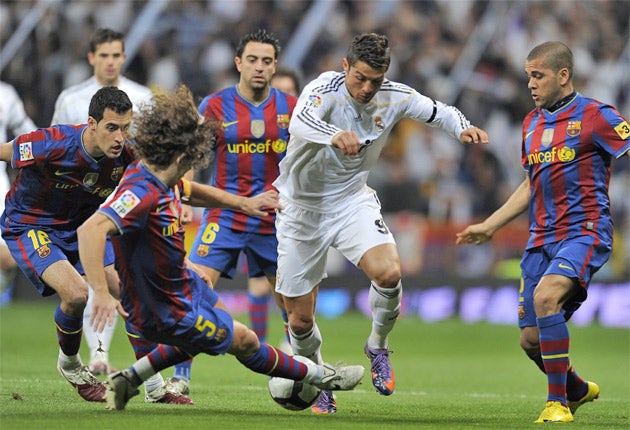Real and Barça told to cut Spain's wealth gap to boost league's value

Your support helps us to tell the story
From reproductive rights to climate change to Big Tech, The Independent is on the ground when the story is developing. Whether it's investigating the financials of Elon Musk's pro-Trump PAC or producing our latest documentary, 'The A Word', which shines a light on the American women fighting for reproductive rights, we know how important it is to parse out the facts from the messaging.
At such a critical moment in US history, we need reporters on the ground. Your donation allows us to keep sending journalists to speak to both sides of the story.
The Independent is trusted by Americans across the entire political spectrum. And unlike many other quality news outlets, we choose not to lock Americans out of our reporting and analysis with paywalls. We believe quality journalism should be available to everyone, paid for by those who can afford it.
Your support makes all the difference.Real Madrid and Barcelona risk diminishing La Liga's appeal to television clients if they do not agree soon to share broadcast income more equitably with their rivals, a leading Spanish finance expert has warned.
The Spanish league does not yet use the system of revenue distribution common among European peers. Real and Barca, who negotiate TV deals individually and are the world's richest clubs by income, get about half the total pot of around €600m (£526m). As a result, most other Spanish top flight clubs are unable to meet the huge wage demands of top players or pay the sizeable transfer fees needed to buy them and they have no real hope of competing for the domestic title.
Many have slipped ever further into the red, with several, such as Real Mallorca, Malaga and Levante, being forced into administration.
Barca set a points record in winning the league last season, with Real three back in second. Valencia, who were forced to sell their prize assets David Villa and David Silva in the close season, were 25 points behind Real in third.
"None of the other clubs, as it stands today, have serious and well-founded hopes of winning the title," explained Jose Maria Gay, a professor of accounting and soccer finance expert at the University of Barcelona. "If Real Madrid and Barcelona make the effort and give up part of their income to help the other clubs it would only be a short-term sacrifice.
"Over the longer term, with a more competitive league and a better level of quality among the other clubs, they would earn even more."
Real, Barca and their La Liga rivals have had several meetings to try to thrash out a deal on sharing TV revenue and are due to hold talks again on 22 October. However, any agreement would not come into effect until around 2014, after current contracts expire, and the proposals tabled most recently would guarantee current income and only share whatever extra amounts clubs managed to negotiate in any new deal with television companies.
The consensus among analysts is that they could expect between €200m and €300m more annually than the current total of around €600m.
Under a proposal from Real and Barca, the pair would get 34 per cent of the extra income, with 11 per cent for Valencia and Atletico Madrid and the rest shared among the remaining 16 clubs based on their position in the league standings.
An alternative proposal from Villarreal would result in 40 per cent of the extra income being shared equally and 60 per cent distributed according to results on the pitch.
"What is evident is that the two sides are far apart and the talks are very much open," Seville, who oppose the Real and Barca model, said in a statement after the latest meeting on 5 October.
The gap between rich and poor in La Liga is wide. A study published in May by Sport+Markt, a consulting firm, showed Real and Barca earned almost 19 times more from TV deals than the smallest clubs in the top division, by far the biggest gap among European leagues. The richest clubs in the English Premier League, by contrast, earned around 1.7 times more than their smaller rivals.
Real earned €145m (£127m) from selling broadcast rights for the 2008-09 season, compared with €2.6m (£2.28m) for Sporting Gijon and €2.4m (£2.1m) for Numancia, according to a study Gay published in May. Manchester United earned £53m last season while relegated Portsmouth got £31.8m, according to Premier League figures.
Angel Barajas, associate professor of financial management at the University of Vigo, said it would be better from the point of view of balanced competition to share total income.
The most effective system for Spain would be one similar to that used in the Premier League, with a fixed minimum, a percentage according to a club's position in the final standings and a percentage according to how many games are broadcast.
There should also be financial aid for clubs that are relegated to offset the income loss, as in the Premier League, Barajas added. "It must be remembered that any new deal would take effect only in 2014."
The Premier League is proud of its distribution model, which has been in existence since the league was created in 1992. "The purpose of the model was to create a stable platform while rewarding success," league spokesman Phil Dorward said.
Join our commenting forum
Join thought-provoking conversations, follow other Independent readers and see their replies
Comments